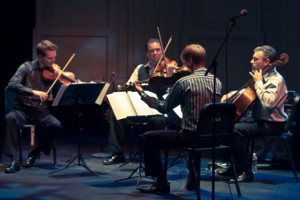(This post supplements my article on Examiner.com.)
Before I was the kind of guy who listens to (and likes) my kid’s music, I was classically trained in piano and was a composition major in college. (My profound apologies to my instructors–you did the best you could. And for you young whippersnappers who are thinking about skipping this blog post because it’s gonna be [kind of] about classical music instead of modern rock or indie bands…read on. You might actually learn something.)
The classical string quartet (two violins, viola and cello) has been around for over 200 years, but many people don’t realize that this musical form was revolutionary in its day. Popularized by great composers like Haydn in the 1700s, string quartet players often relied on improvisation as well as an ability to read and interpret music scores. It was essentially the “jazz” of their day.
In our time, one group in particular has successfully reinvented the string quartet as a modern, progressive art form. That group is the Turtle Island Quartet, who played a tribute to John Coltrane Saturday night at the Lakewood Cultural Center. What makes this quartet unique is that they play a successful fusion between classical chamber music and contemporary music. When I say “successful”, I mean it is no joke, no novelty, no gimmick. I mean these guys make it sound like jazz and rock were meant to be played by two violins, viola and cello. And in their time they’ve also incorporated styles like bluegrass, world music, R&B and even hip-hop into their chamber-music format.
This was my first time hearing this quartet, and I have to tell you it was nothing short of amazing to hear four classical string instruments playing improvisational jazz– and really good jazz at that. As if that weren’t enough, midway through the first half of the program, they announced that they were going to play a selection from their upcoming record, a four-part suite of classic rock–by Jimi Hendrix. If the thought of that makes you laugh, try to imagine hearing a violin or viola imitating the electric guitar riffs of the legend himself, every nuance and arpeggio and rock lick in place–and you’ll stop laughing and just start smiling. What is most amazing about this quartet is that it really works. They make it work, and they make you take them seriously by their outstanding musicianship–which, by the way, has earned them two Grammys so far.
Not only did I have the privilege of hearing these guys play, but I also had the privilege of sitting down with the two original members, David Balakrishnan (violin, baritone violin) and Mark Summer (cello). In talking with them, I discovered that Turtle Island Quartet is the brainchild of composer/arranger Balakrishnan, whose love for both classical and jazz prompted him to try and blend the two in his compositions. It is essentially the teamwork of Balakrishnan (who oversees composition) and Summer (who oversees the implementation of the arrangements) that makes this combination work so well. Their passion for these various styles of music drives them to blend the traditional and modern into something that must be taken seriously–and thus far, no one has really duplicated their efforts.
Balakrishnan and Summer never said as much in our conversation, but really, the music of Turtle Island Quartet is sending a message. Whether intentional or not, the message is this: Hendrix is just as legitimate as Haydn. The music of Coltrane is just as legitimate as that of Mozart. By putting serious rock and jazz into a 200-year-old musical framework, they are legitimizing the music our grandparents and great-grandparents once dismissed as “noise”. In so doing, Turtle Island Quartet has actually done more than just reinvent the string quartet–they’ve made it revolutionary all over again.
And that’s why I’m digressing today from talking about modern bands and artists to talk about Turtle Island Quartet–because many of the musicians we follow today because they are “revolutionary” will be looked upon as the legends and masters of tomorrow. Great musicianship and great writing are timeless, regardless of the genre or style.
So even if you aren’t the type who is into classical music, you ought to pay these guys a little respect–because in a way, they are legitimizing the music you love today. If you ever get the chance, go see Turtle Island Quartet perform. No matter what kind of music you’re into, you will be enriched by the experience.

